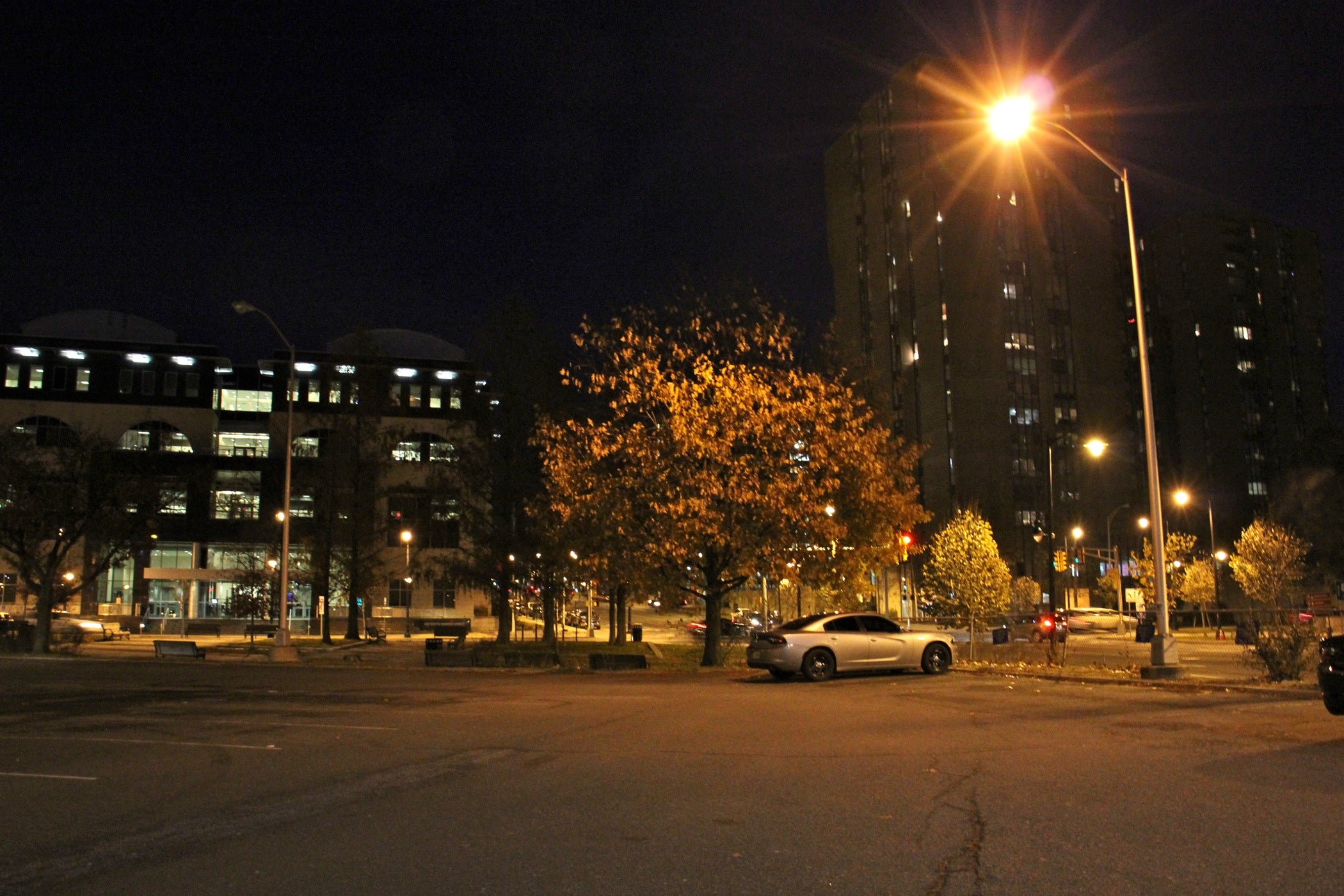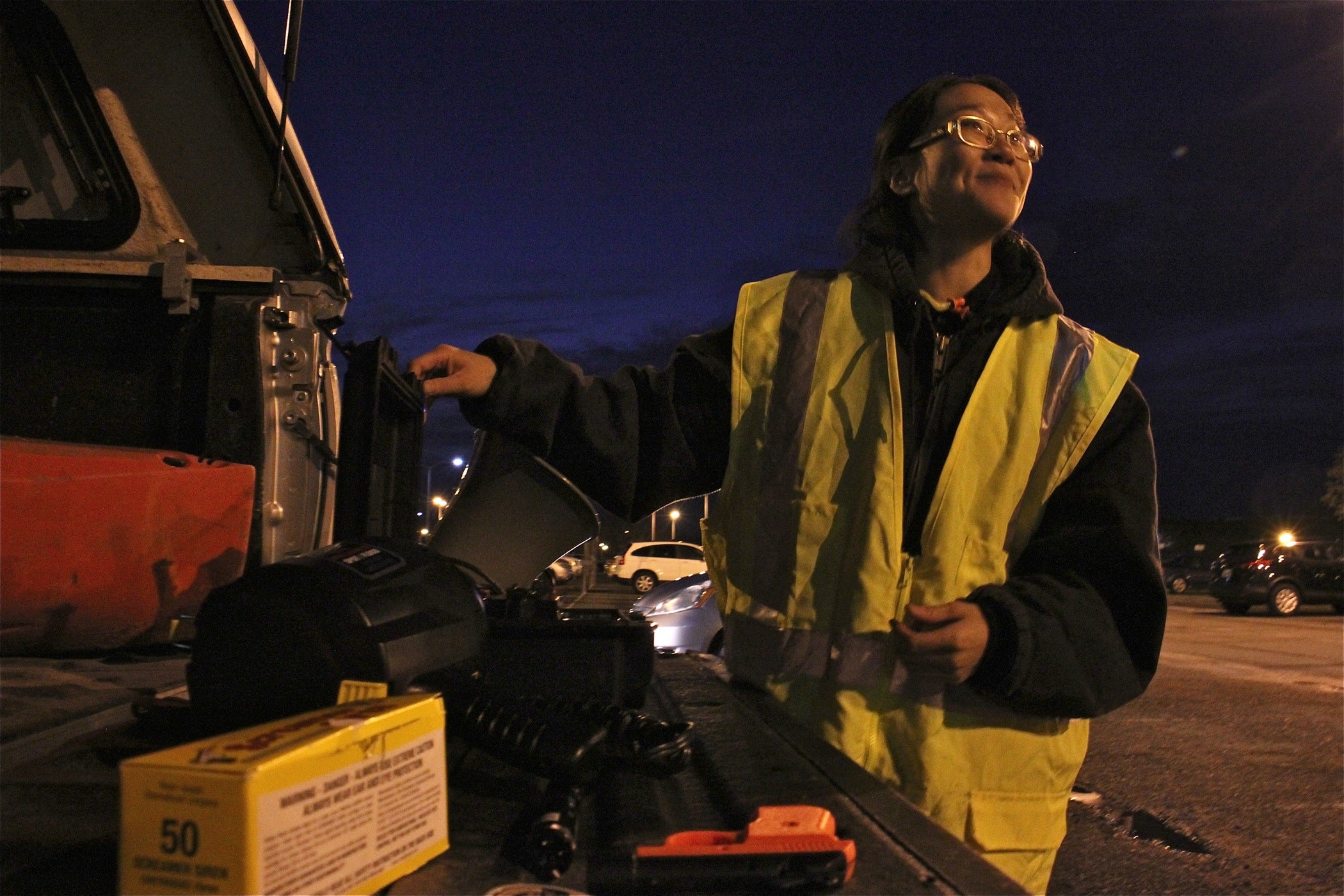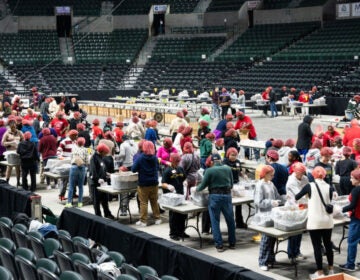Trenton strikes back at crow invasion with pyrotechnics and lasers
New Jersey’s state capitol draws thousands of crows — and their droppings — during colder months. But Trenton is fighting back with help from the USDA.

USDA Wildlife Biologist April Simnor uses pyrotechnics to disperse crows in the parking lot behind New Jersey state government offices on West State Street in Trenton. (Emma Lee/WHYY)
Trenton’s multi-year war on crows is far from over, but on a recent Tuesday night, a federal employee tasked with keeping tens of thousands of the cawing birds at bay felt like she’d won a small battle.
Two years ago, when Trenton officials first asked April Simnor, a wildlife biologist with the U.S. Department of Agriculture, to help them manage the increasing number of crows in the city, some 20,000 birds shrouded the sky with their bodies in scenes worthy of Alfred Hitchcock’s “The Birds.”
The murders, or groups, of crows, also made their presence known in the downtown parking lots below.
“Before we came here (in 2017), these parking lots were covered in fecal material — the sidewalks, the lampposts, street signs,” Simnor explained. “You couldn’t even read street signs.”

But on this Tuesday night in New Jersey’s state capitol, there’s little fecal material to be found anywhere. To Simnor, that’s a sign her feathered foes aren’t around.
It’s unclear why crows chose to make Trenton a place to sleep during the winter months several years ago, but it’s not the only city to report the phenomenon.
As the temperature drops, cities across the country, including Portland, Oregon, Wichita, Kansas, cite these urban roosts.
In New Jersey, Simnor said it’s unclear how many other cities become winter roost venues. The USDA doesn’t survey the crow population statewide, and it can only respond if invited by municipalities.
It’s believed that the birds sleep in masses to keep warm, and cities have become increasingly popular for this because they’re better lit and enjoy warmer temperatures than rural areas because of all the humans and construction. According to Simnor, Trenton’s downtown parking lots, which are largely empty in the evenings when state workers clear out, also attract crows.
Trenton residents have not been fans either.
That’s because the crows are loud early risers and in large numbers, can wake the deepest of human sleepers. Their droppings are also unsightly and pose health concerns, increasing the risk of histoplasmosis, a lung infection caused by a fungus that can be found in bird droppings, according to Simnor.
After residents complained, Trenton asked the USDA to help manage the birds. The USDA runs intense two-week dispersal programs in November, followed by monthly maintenance checks through March.
The idea is not to cull the crows, but to disperse a single murder of thousands of crows into smaller, more manageable groups to other parts of the city.
The methods are akin to psychological warfare — necessary for what Simnor described as a highly intelligent bird with an excellent memory.
Simnor plays recordings of distressed crows from the back of her truck. Typically, crows will respond to the calls, which let Simnor know where she needs to place her attention.
Another tool to draw the birds out from the treeline is a small pyrotechnic gun about the size of a hand. Shooting the gun sets off a small flare and nearby crows will typically caw in response to the sound. Then, Simonor often uses a spotlight and green lasers to annoy and scare the birds.
To humans, the laser looks like just a tiny dot on the ground, like the kind you use to entertain cats.
“But from the birds’ point of view, they actually see the beam of light, so it almost looks like an arm is reaching out toward them,” Simnor explained. “So you don’t need to necessarily point it at their heads or their eyes. You can just point it near them and they’ll react to that.”
The whole experience gives the birds such a fright they go elsewhere and stay away from downtown Trenton for a while, if only for a short time. Simnor will have to return the following month to make sure the crows haven’t laid claim to the lots again.

But her methods appear to be working for now.
On a recent evening after dusk, Simnor set off her distressed crow sounds at a downtown Trenton parking lot. The trees surrounding the parking lot didn’t move.
Employees from nearby state government buildings had cleared out after 5 p.m. — and it appeared the crows had hit the road as well.
“No crows answered our crow caller, so I would say this area does not have crows,” she said.
Still, Simnor said the birds are not entirely gone from Trenton. Creatures of habit, the crows are expected to return every year, though it’s unclear just how many there are in the city at the moment because they don’t fly thousands at a time anymore.
“They’re still in this area, ” she said. “They’re just going to be in groups that (are) more tolerable for people.”
WHYY is your source for fact-based, in-depth journalism and information. As a nonprofit organization, we rely on financial support from readers like you. Please give today.





